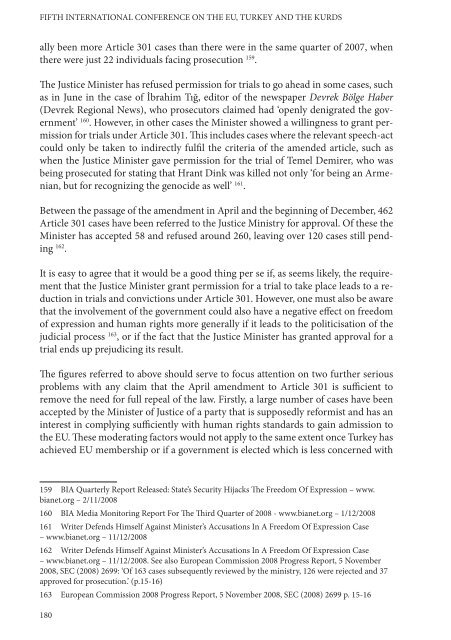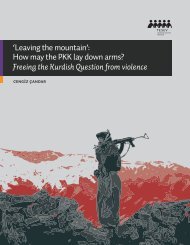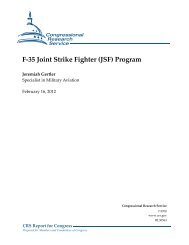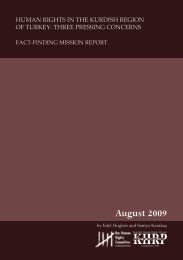FIFTH INTERNATIONAL CONFERENCE ON THE EU TURKEY AND THE KURDS
fifth international conference on the eu, turkey and the kurds
fifth international conference on the eu, turkey and the kurds
Create successful ePaper yourself
Turn your PDF publications into a flip-book with our unique Google optimized e-Paper software.
<strong>FIFTH</strong> <strong>INTERNATI<strong>ON</strong>AL</strong> <strong>C<strong>ON</strong>FERENCE</strong> <strong>ON</strong> <strong>THE</strong> <strong>EU</strong>, <strong>TURKEY</strong> <strong>AND</strong> <strong>THE</strong> <strong>KURDS</strong><br />
ally been more Article 301 cases than there were in the same quarter of 2007, when<br />
there were just 22 individuals facing prosecution 159 .<br />
The Justice Minister has refused permission for trials to go ahead in some cases, such<br />
as in June in the case of İbrahim Tığ, editor of the newspaper Devrek Bölge Haber<br />
(Devrek Regional News), who prosecutors claimed had ‘openly denigrated the government’<br />
160 . However, in other cases the Minister showed a willingness to grant permission<br />
for trials under Article 301. This includes cases where the relevant speech-act<br />
could only be taken to indirectly fulfil the criteria of the amended article, such as<br />
when the Justice Minister gave permission for the trial of Temel Demirer, who was<br />
being prosecuted for stating that Hrant Dink was killed not only ‘for being an Armenian,<br />
but for recognizing the genocide as well’ 161 .<br />
Between the passage of the amendment in April and the beginning of December, 462<br />
Article 301 cases have been referred to the Justice Ministry for approval. Of these the<br />
Minister has accepted 58 and refused around 260, leaving over 120 cases still pending<br />
162 .<br />
It is easy to agree that it would be a good thing per se if, as seems likely, the requirement<br />
that the Justice Minister grant permission for a trial to take place leads to a reduction<br />
in trials and convictions under Article 301. However, one must also be aware<br />
that the involvement of the government could also have a negative effect on freedom<br />
of expression and human rights more generally if it leads to the politicisation of the<br />
judicial process 163 , or if the fact that the Justice Minister has granted approval for a<br />
trial ends up prejudicing its result.<br />
The figures referred to above should serve to focus attention on two further serious<br />
problems with any claim that the April amendment to Article 301 is sufficient to<br />
remove the need for full repeal of the law. Firstly, a large number of cases have been<br />
accepted by the Minister of Justice of a party that is supposedly reformist and has an<br />
interest in complying sufficiently with human rights standards to gain admission to<br />
the <strong>EU</strong>. These moderating factors would not apply to the same extent once Turkey has<br />
achieved <strong>EU</strong> membership or if a government is elected which is less concerned with<br />
159 BIA Quarterly Report Released: State’s Security Hijacks The Freedom Of Expression – www.<br />
bianet.org – 2/11/2008<br />
160 BIA Media Monitoring Report For The Third Quarter of 2008 - www.bianet.org – 1/12/2008<br />
161 Writer Defends Himself Against Minister’s Accusations In A Freedom Of Expression Case<br />
– www.bianet.org – 11/12/2008<br />
162 Writer Defends Himself Against Minister’s Accusations In A Freedom Of Expression Case<br />
– www.bianet.org – 11/12/2008. See also European Commission 2008 Progress Report, 5 November<br />
2008, SEC (2008) 2699: ‘Of 163 cases subsequently reviewed by the ministry, 126 were rejected and 37<br />
approved for prosecution.’ (p.15-16)<br />
163 European Commission 2008 Progress Report, 5 November 2008, SEC (2008) 2699 p. 15-16<br />
180





